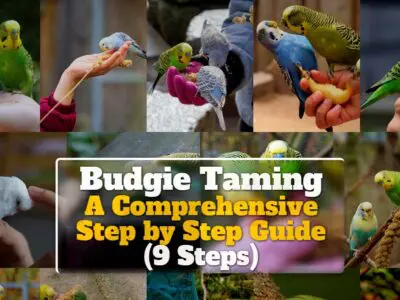Gaining a budgie’s trust involves understanding its behavior and creating the right environment.
Begin by settling your budgie in a comfortable space, and slowly introduce treats and soft conversations.
As the trust develops, incorporate gentle hand-taming exercises and playful interactions. Consistency, patience, and understanding their emotional cues are crucial to this process.
Budgies, with their delightful chirps and lively demeanor, have always held a special place in my heart.
If you’re keen on fostering a stronger bond with your budgie, this guide, born from my years of experience and observation, is your roadmap.
Dive in to uncover the steps, insights, and techniques to earn your feathered friend’s trust.
Step-by-Step: Gaining Your Budgie’s Trust
Building trust with your budgie is a journey that involves patience, understanding, and consistent positive interactions.
Here’s a simplified guide to help you foster a deep bond with your feathered friend.
1. Settling In: Giving your budgie time to adapt to the new environment.
Every budgie, just like us, needs time to get familiar with new places.
When you first bring your budgie home, give them space. Let them explore their cage, get used to where their food and water are, and simply observe their new surroundings.
This initial step is crucial because a comfortable budgie is more likely to trust faster.
2. Trust-Building Through Feeding: The power of treats.
Food is a universal language. One of the best ways to start trust-building is by hand-feeding your budgie treats.
Whether it’s a small piece of fruit or a special seed, offering it from your hand can help bridge the gap.
If your budgie is hesitant, try placing the treat near your hand and gradually move it closer with each feeding session.
3. Building a Connection Through Voice: Calm conversations and soft music.
Your voice can be a soothing presence for your budgie. Spend time talking softly to them.
Over time, they’ll start associating your voice with safety. Playing soft music or nature sounds can also create a calm atmosphere that budgies find reassuring.
Remember, it’s about creating an environment where they feel secure and at ease.
4. Gentle Physical Interaction: Hand-taming and trust exercises.
Once your budgie is comfortable with your presence and voice, you can begin with hand-taming exercises.
Start by placing your hand slowly and gently inside the cage without making any sudden movements.
Over time, your budgie may approach your hand out of curiosity. Reward this bravery with treats.
As they get more comfortable, they might even perch on your finger!
5. Introducing Play: Incorporating toys and playful interactions.
Budgies are playful creatures. Introducing toys that they can interact with can further enhance your bond.
Toys like bells, ladders, or mirrors can provide them with entertainment and stimulation.
As your budgie becomes more comfortable, you can also engage in playful interactions outside the cage, like letting them fly in a safe space or playing gentle games.
6. Reinforcing Trust: Using positive reinforcement techniques.
Positive reinforcement means rewarding your budgie for desirable behavior. This can be with treats, verbal praises, or simple gestures like gentle head scratches.
The idea is to let your budgie know that they’re doing a great job and you appreciate their trust.
Over time, these positive interactions will solidify your bond and make your budgie more confident around you.
The Science of Trust: Understanding Budgie Behavior and Emotions
Every budgie owner, at some point, wishes they could read their pet’s mind.
While we might not be able to do that, understanding their behavior and emotions is the next best thing!
Budgies express trust and fear in various ways. A trusting budgie often has relaxed body language.
They may puff up their feathers, which is a sign of comfort, or they might grind their beak when they’re content.
On the other hand, a fearful budgie will try to make itself look bigger, often by standing tall and extending its feathers.
Rapid breathing, a sharp alert posture, and dilated pupils might indicate fear or anxiety.
| Sign | Meaning |
|---|---|
| Puffed up feathers | Comfort and Relaxation |
| Beak grinding | Contentment |
| Extended feathers & tall posture | Fear or Anxiety |
| Rapid breathing | Fear or Anxiety |
Signs of Trust: How Do You Know Your Budgie Trusts You?
Earning a budgie’s trust is a milestone, and it’s essential to recognize the signs when they start seeing you as a friend.
Deciphering positive physical cues and vocal signals.
A budgie uses its body and voice to communicate. Positive cues include leaning towards you, soft chirping when you approach, and fluffing up their feathers.
A head tilt, while it often signifies curiosity, can also indicate trust when done in your presence.
Vocal cues, on the other hand, such as singing or mimicking sounds, are strong indicators that your budgie is at ease.
Observing their behavior inside and outside the cage.
Inside the cage, a trusting budgie will often come to the side of the cage nearest you.
They might even hop onto your hand without any coaxing. Outside the cage, a budgie that trusts you will often fly to you or stay close by, rather than flying away or trying to hide.
The significance of their reaction towards your presence and touch.
The ultimate sign of trust is when a budgie allows you to touch it.
If they remain calm and don’t pull away when you gently stroke their feathers or if they even initiate contact, like nuzzling against your hand or face, it’s a clear sign of trust.
Remember, these moments are precious and show the depth of the bond you’ve built with your little feathered companion.
Factors Influencing Trust Building in Budgies
Understanding the various elements that influence the trust-building process with budgies is crucial.
These elements can be broken down into their past experiences, the environment you create for them, and your interactions with them.
Background and Past Experiences
Every budgie is unique, and their past experiences shape their behavior.
New budgie vs. an older pet budgie: different trust-building approaches.
A new budgie, especially a young one, might not have had many interactions with humans.
This can mean they are curious but also might be more cautious.
They’re like a blank slate, so it’s essential to provide positive experiences from the start.
In contrast, an older pet budgie might have established habits and memories of past interactions.
If they’ve had positive experiences, they might trust humans quicker. But, if they’ve faced neglect or negative experiences, it could take longer to earn their trust.
The unique challenges of fostering trust with wild or traumatized budgies.
Wild or traumatized budgies require extra care and patience. They might see humans as threats due to their past experiences.
Wild budgies aren’t used to human interaction, so every experience is a new one for them.
Traumatized budgies, on the other hand, might associate humans with negative memories.
With time, patience, and consistent positive interactions, trust can still be developed.
Creating the Right Environment
Your budgie’s surroundings play a significant role in their ability to trust.
Ensuring safety and comfort for quicker trust-building.
Budgies need to feel safe. This means having a comfortable cage with enough space to move around.
It should also be free from drafts or direct sunlight. Toys and perches provide both entertainment and comfort.
A safe and cozy environment helps budgies feel more relaxed and open to interactions.
The role of cage positioning and the surrounding environment.
Where the cage is placed is crucial. It should be at eye level so the budgie doesn’t feel threatened.
Avoid high-traffic areas where there’s a lot of movement. The surrounding environment should be calm.
Sudden noises or movements can startle them. The more peaceful their surroundings, the more at ease they’ll feel.
The Role of Human Interaction
Your behavior and actions are pivotal in trust-building.
Consistency, patience, and empathy in trust-building.
Being consistent is key. This means spending regular time with your budgie every day.
Even if it’s just sitting by their cage and talking softly. Over time, they’ll associate your voice and presence with safety.
Remember to always move slowly and gently, understanding that trust-building is a journey.
Common mistakes to avoid: sudden movements, loud sounds, and inconsistent routines.
Budgies are sensitive to their surroundings. Sudden movements can scare them. Always approach their cage slowly and speak in a calm, gentle voice.
Loud sounds can be stressful, so it’s essential to keep their environment as quiet as possible.
Finally, budgies thrive on routine. Feeding them, cleaning their cage, and interacting with them at consistent times will help them feel more secure.
Bumps in the Road: Rebuilding Trust
Trust, once damaged, requires patience and understanding to restore. When it comes to your budgie, recognizing when and why trust has been lost is the first step to mending the bond.
Budgies show loss of trust in various ways: refusing to come near, vocalizing distress, or showing defensive behaviors.
These signs can emerge from several causes, such as sudden loud noises, changes in environment, or perhaps an unintentional rough handling.
First and foremost, be patient. Rebuilding trust can be a lengthy process.
Restart with basics like soft talking and offering treats. Returning to familiar routines can also help since budgies find comfort in predictability.
Finally, make sure to address and eliminate the cause of distress, ensuring it doesn’t recur.
During this sensitive phase, avoid making sudden movements or introducing unfamiliar objects.
Steer clear of loud noises, and always move with caution around your budgie to prevent further mistrust.
FAQs
Questions about budgies and their behavior can be numerous, and it’s always helpful to have some answers to frequently asked queries.
Here are some insights into the beautiful journey of understanding and bonding with these wonderful feathered friends.
How Can I Tell If My Budgie Is Beginning to Trust Me?
Recognizing trust in a budgie often involves observing subtle changes in their behavior.
When your budgie starts to come closer, stays calm when you’re near, eagerly takes treats from your hand, or enjoys your company without exhibiting signs of stress, these are all indications that trust is building.
What Kind of Budgie Should I Get for a Stronger Bond?
For a stronger bond with your budgie, consider getting a baby male budgie.
Baby budgies, especially males, can often lead to a deeper connection. Since they’re young, they haven’t developed many habits or fears.
They’re naturally curious and adaptable, which makes trust-building smoother. Male budgies are particularly friendly, talkative, and playful, enhancing the bond further.
However, every budgie is unique, so patience and care are key to forming a deep connection.
Why Might My Budgie Suddenly Be Afraid of Me?
Budgies can become fearful due to various reasons. Sudden changes in their environment, negative experiences (like a loud noise or rough handling), or even unfamiliar objects can spook them.
It’s essential to keep their environment consistent and approach them with patience and understanding.
How Can Trust Be Rebuilt after an Adverse Event?
Rebuilding trust involves patience and going back to the basics. Start with soft talking, offering their favorite treats, and being consistent in your interactions.
Remember, it’s crucial to eliminate or address the cause of distress to prevent future issues.
How Frequent Should Our Interactions Be?
Daily interactions are ideal. Consistency is vital in building trust. Even if it’s just for a few minutes, ensure you spend some quality time with your budgie every day.
This consistency reinforces the bond and helps in establishing routines.
Can Budgies Show Trust Towards Multiple Human Caretakers?
Yes, budgies can establish trust with more than one human. With consistent, gentle interactions from all caretakers, a budgie can form bonds with multiple people.
How Do Budgie Emotions Compare to Those of Other Pet Birds?
Budgies, like all birds, have a unique emotional range. While they share common emotions like fear, trust, and curiosity with other pet birds, each species may have its nuances.
Budgies are known for their curious nature and strong bonding capabilities when compared to some other pet birds.
Are There Specific Treats That Are More Effective in Trust-Building?
Budgies often have a soft spot for millet sprays. Offering this treat from your hand can be a potent trust-building exercise.
How Can You Ensure You’re Not Overwhelming Your Budgie During Interaction?
Always observe your budgie’s body language. If they seem agitated, stressed, or want to fly away, it might be best to give them some space.
Start with short interactions and gradually increase the time as they get more comfortable.
Can Playing Soft Music Continuously Aid in Faster Trust-Building?
Soft music can indeed have a positive impact on budgies. It provides a calming atmosphere and can mask sudden, loud noises that might startle them.
What Are the Signs That Your Budgie Is Ready for Physical Interaction?
When a budgie is prepared for physical interaction, it may display curiosity towards your hand, not flinch or retreat when you’re nearby, and might even try to approach you.
Listening to their chirps and observing relaxed body language can indicate readiness for closer interaction.
How to Identify if Your Budgie Is Not Enjoying a Particular Toy or Play Activity?
A budgie that’s not enjoying a toy might ignore it completely, avoid the area where the toy is placed, or even seem agitated when the toy is nearby.
It’s essential to rotate toys and observe which ones your budgie prefers to engage with.
Is There a Specific Time of Day That’s Best for Trust-Building Activities?
Budgies are most active during the early morning and late afternoon. These times are often ideal for trust-building activities.
It’s when they’re most alert and responsive.
After How Long Should One Begin Introducing Advanced Activities Like Tricks?
Once you notice that your budgie is fully comfortable with basic interactions, you can consider introducing advanced activities.
This might be after several weeks or even months of consistent trust-building.
Always introduce new tricks or tasks gradually and use positive reinforcement.
How to Deal with Overattachment Issues in Budgies After Establishing Trust?
Overattachment can be a sign of a deep bond, but it’s essential to ensure your budgie also has independence.
Encourage playtime inside the cage with toys, introduce short periods of separation, and make sure they’re mentally stimulated even when you’re not around.
This balance helps in fostering a healthy relationship.



